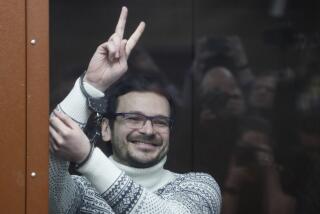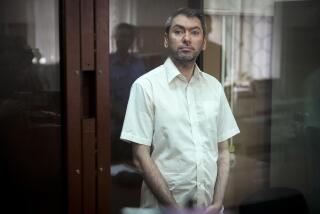Kremlin Finds No Fault With Sakharov Stand
- Share via
MOSCOW — A senior Soviet official said Tuesday that he has no objection to Andrei D. Sakharov’s criticism of Soviet intervention in Afghanistan, which the dissident voiced during his first remarks to foreign reporters after being released from nearly seven years in internal exile.
There was no immediate reaction, however, to the dissident physicist’s appeal for the release of all Soviet citizens imprisoned for their beliefs.
In general, Soviet authorities took a tolerant attitude toward the outspoken champion of human rights, who returned to Moscow early Tuesday from the industrial city of Gorky and an exile that began Jan. 22, 1980.
His wife, Yelena Bonner, who herself was outspokenly critical during a six-month trip she made to the West for medical care earlier this year, returned with her husband but was largely silent upon their arrival.
Sakharov, who rested awhile in his center-city apartment after a sleepless night on the train from Gorky, 250 miles east of the capital, attended a seminar on contemporary science at the Physics Institute of the Academy of Sciences as one of his first acts in the capital.
According to some of his colleagues, he was applauded and given a warm reception at the institute.
“It was wonderful to have him back and to see him again,” one scientist said.
Earlier, in a walking news conference with more than 100 journalists, Sakharov made it clear that he was not going to guard his comments about human rights cases.
Question on Afghanistan
Asked about Afghanistan, where the Soviet Union has sent more than 115,000 troops to bolster a pro-Moscow regime, Sakharov replied:
“I consider this to be the most painful point of our foreign policy. And I hope that more decisive measures will be taken in this area than are being taken now . . . to resolve this tragedy.”
Although Sakharov was exiled shortly after he criticized the invasion of Afghanistan, Foreign Ministry official Yuri B. Kashlev said the physicist’s remarks Tuesday were harmless.
“I do not see anything bad in this comment of Sakharov’s,” Kashlev said at a later news conference. “Our leadership has stated on many occasions that we are seeking a solution of the problem in Afghanistan as soon as possible. . . . If he is going to speak on international affairs honestly, he will not be punished.”
Asked if the release of the Nobel Peace Prize winner meant that the Soviet government now considers it a mistake to have banished him in the first place, Kashlev demurred.
“A part of his activity passed the threshold” of permissible dissent, said Kashlev, who is head of the Department of Humanitarian Affairs at the Foreign Ministry. “The decision (to impose exile on Sakharov) involved all the wrongdoings he committed--acts regarded as anti-Soviet activities. It was not a question of his moral dissent.”
More to Read
Sign up for Essential California
The most important California stories and recommendations in your inbox every morning.
You may occasionally receive promotional content from the Los Angeles Times.










